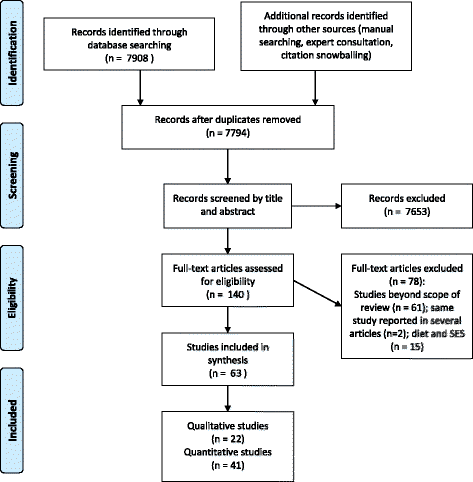Systematic mapping review of the factors influencing physical activity and sedentary behaviour in ethnic minority groups in Europe: a DEDIPAC study
- PMID: 28738832
- PMCID: PMC5525226
- DOI: 10.1186/s12966-017-0554-3
Systematic mapping review of the factors influencing physical activity and sedentary behaviour in ethnic minority groups in Europe: a DEDIPAC study
Abstract
Background: Physical activity and sedentary behaviour are associated with health and wellbeing. Studies indicate that ethnic minority groups are both less active and more sedentary than the majority population and that factors influencing these behaviours may differ. Mapping the factors influencing physical activity and sedentary behaviour among ethnic minority groups living in Europe can help to identify determinants of physical activity and sedentary behaviour, research gaps and guide future research.
Methods: A systematic mapping review was conducted to map the factors associated with physical activity and sedentary behaviour among ethnic minority groups living in Europe (protocol PROSPERO ID = CRD42014014575). Six databases were searched for quantitative and qualitative research published between 1999 and 2014. In synthesizing the findings, all factors were sorted and structured into clusters following a data driven approach and concept mapping.
Results: Sixty-three articles were identified out of 7794 returned by the systematic search. These included 41 quantitative and 22 qualitative studies. Of these 58 focused on physical activity, 5 on both physical activity and sedentary behaviour and none focused on sedentary behaviour. The factors associated with physical activity and sedentary behaviour were grouped into eight clusters. Social & cultural environment (n = 55) and Psychosocial (39) were the clusters containing most factors, followed by Physical environment & accessibility (33), Migration context (15), Institutional environment (14), Social & material resources (12), Health and health communication (12), Political environment (3). An important finding was that cultural and religious issues, in particular those related to gender issues, were recurring factors across the clusters.
Conclusion: Physical activity and sedentary behaviour among ethnic minority groups living in Europe are influenced by a wide variety of factors, especially informed by qualitative studies. More comparative studies are needed as well as inclusion of a wider spectrum of the diverse ethnic minority groups resettled in different European countries. Few studies have investigated factors influencing sedentary behaviour. It is important in the future to address specific factors influencing physical activity and sedentary behaviour among different ethnic minority groups in order to plan and implement effective interventions.
Keywords: Ethnic minority groups; Europe; Factors; Immigrants; Migrants; Physical activity; Sedentary behaviour.
Conflict of interest statement
Ethics approval and consent to participate
Not applicable.
Consent for publication
Not applicable.
Competing interests
The authors declare that they have no competing interests.
Figures
References
-
- Crepso CJ, Smit E, Andersen RE, Carter-Pokras O, Ainsworth BE. Race/ethnicity, social class and their relation to physical inactivity during leisure time: results from the third National Health and nutrition examination survey, 1988–1994. Am J Prev Med. 2000;18(1):46–53. doi: 10.1016/S0749-3797(99)00105-1. - DOI - PubMed
-
- Whitt-Glover MC, Taylor WC, Floyd MF, Yore MM, Yancey AK, Matthews CE. Disparities in physical activity and sedentary behaviors among US children and adolescents: prevalence, correlates, and intervention implications. J Public Health Policy. 2009;30(Suppl 1):S309–S334. doi: 10.1057/jphp.2008.46. - DOI - PubMed
Publication types
MeSH terms
Grants and funding
LinkOut - more resources
Full Text Sources
Other Literature Sources
Medical


